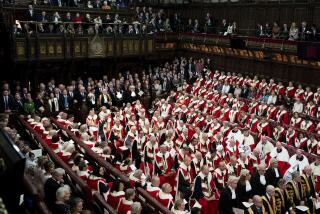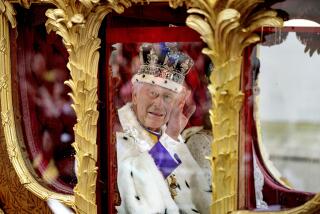Retains British Support : The House of Lords: Odd but It Works
- Share via
LONDON — “People talk of change in the House of Lords,” the 2nd Baron Denham said, “but the remarkable thing is how much it has remained the same.”
Denham, the senior Conservative Party peer, was talking with a reporter the other day amid the clutter of his cramped office, and although he was referring specifically to his four decades in the upper chamber of Parliament, many would agree that his assessment also applies to the past 700 years.
The House of Lords, Europe’s oldest working legislative assembly, is anchored in antiquity. Its ornate chamber is filled with the symbols of empire, and its members are appointed solely because they or some forebear happened to please a monarch or prime minister at some time between the late 13th Century and last New Year’s Day.
Active in Lawmaking
That a parliamentary chamber filled with dukes, barons, earls, bishops and countesses survives at all in a modern Western democracy is surprising. That it retains an active, if limited, role in the nation’s lawmaking process, and enjoys broad public support, is a reflection of Britain’s unusual ability to adapt ancient institutions to the rigors of modern life.
Many believe that it is the continuity of such institutions that provides stability and security in Britain, which has no written constitution.
“If we were starting from scratch, no one in his right mind would invent the second chamber in precisely its present form,” said the Baroness Seear, deputy leader of the Liberal and Social Democratic Party’s peers.
Denham said, “It’s indefensible, of course, but it also happens to work quite well.”
Secondary to Commons
The Lords, as an appointed house, plays an acknowledged secondary role to the elected lower house, the House of Commons. By convention, it no longer challenges the thrust of a government’s legislative program. Indeed, even Lords’ amendments can be overturned by the Commons. But the Lords’ questioning of detail, its scrutiny and ability to delay, can focus uncomfortable publicity on subjects the government might prefer to gloss over.
“It does not, in the immediate sense, determine the fate of governments, but it is capable of being an immense nuisance to them,” the Times of London observed not long ago in an editorial.
Pivotal to the Lords’ influence is the presence of an older generation’s highest achievers, appointed peers for life, who are seen as dispensing their collective wisdom unfettered by the pressures of the party politics that dominates the Commons.
Twice before his death 18 months ago, the Earl of Stockton, better known as the former Conservative Prime Minister Harold Macmillan, delivered subtle but stinging indictments of Margaret Thatcher’s policies that no elected member of her party could make.
“He had all of us on the front (ministerial) benches squirming,” said the 2nd Baron Trefgarne, a minister of state in the Defense Ministry.
In recent weeks, government ministers in the Lords have been restless again, with prominent elder statesmen from Thatcher’s Conservative Party among those speaking out against what one called the “in-built inequalities” of her government’s controversial proposals for property tax reform.
Those at the forefront of debate in the Lords are often experts on the issue at hand, and this tends to make debate more informed and less politically charged than in the Commons.
Detailed Preparation
Trefgarne emphasized that presenting government defense policy to a house that includes three former defense ministers and three former chiefs of the defense staff is something that requires detailed preparation.
“The strength of the House,” said Lord Boyd-Carpenter, leader of the Conservative back-bench in the upper chamber, “is the experience that’s there. There is no subject I know of that, when it comes up, doesn’t have someone who can speak as a leading authority on it.”
He was not exaggerating. In addition to the three former prime ministers--Alexander Douglas-Home, Harold Wilson and James Callaghan--the Lords’ membership list looks like “Who’s Who.” It includes among others the Oxford historian Robert Blake, Field Marshal Edwin Bramall, who is former chief of the general staff, British Airways Chairman John King, nuclear physicist Brian Flowers, actor Laurence Olivier and Everest mountaineer John Hunt.
Youth and Variety
The 359 so-called life peers, appointed for individual achievement, tend to exert disproportionate influence among the 1,195 members, but many hereditary peers are also active, adding youth and variety to the Lords.
For example, the 5th Baron Monkswell, who is 41, has been a truck driver, a laborer and a turret-lathe operator. The 3rd Baron Colwyn has led a rock band, and the 6th Baron Carrington recently stepped down as secretary general of the North Atlantic Treaty Organization.
The 7th Earl of Cowley, Garret Wellesley, was born on a Nevada cattle ranch, was educated at the University of Southern California and Harvard Business School and takes part frequently in debate on financial and economic affairs.
Chief Rabbi Included
Earlier this year the chief rabbi of Britain, Immanuel Jakobovits, joined 26 Anglican bishops in the Lords, but no Catholic Church leader has entered the chamber since Cardinal John Fisher was beheaded 453 years ago in the time of Henry VIII.
Prince Charles and Prince Andrew, and their father the Duke of Edinburgh, are also members of the Lords, though they rarely attend. On average, advancing age and often-extensive outside interests have combined to limit daily attendence in the Lords to scarcely a fourth of the membership.
In the years since World War II, the Lords has acted to moderate radical legislation. When Labor nationalized the aerospace and shipbuilding industries in the mid-1970s, the Lords amended the legislation to exclude ship repair firms. A few years later the Lords blocked an attempt by the Thatcher government to make rural families pay for school bus services, arguing that it interfered with the right to free education.
‘Cross-Benchers’ Prevail
Although Conservative Party strength has traditionally outstripped that of the other major parties in the Lords, the views of some 200 independent peers--”cross-benchers,” they are called--are usually the determining factor.
Since 1979, Thatcher’s government has been defeated more than 100 times in the Lords. Today, the chamber is viewed by many Labor supporters as a potential ally against the most controversial elements of Thatcher’s reforms.
Foreigners, especially from other Western countries, find the Lords’ unusual mix of ritual and function difficult to comprehend. The Lords chamber, with its imposing throne and ornate gold canopy, its division into sides temporal and spiritual--there are seats reserved for Anglican bishops--all under the control of the wigged, robed Lord Chancellor, is a daunting sight.
On ceremonial occasions, the members’ scarlet, ermine-collared robes and somber, centuries-old ritual tend to magnify the notion that the chamber exists in a kind of time warp.
Tribal Chief ‘Impressed’
Edward Taylor, a member of Parliament, once joked that of all the many foreigners he had ushered through the Lords, the one who immediately understood and approved the idea was an African tribal chieftain. “He was impressed,” Taylor noted.
The solemnity of the Lords and the preponderance of elderly life peers usually in attendance has left the house open to parody as a glorified retirement home--and not without reason. Stooped, gray-haired men, surrounded by symbols of state, fiddling with hearing aids and walking sticks, others nodding off to the drone of debate--all are commonly seen in the Lords.
Peers recall the day the late Lord Salisbury rose to intervene in a debate and became hopelessly entangled in the cord of his hearing aid.
Jeremy Thorpe, the Liberal Party leader of the 1970s, once commented wryly that the Lords was proof that there was life after death. A colleague summed up the mood of the Lords as a place “waiting in decrepitude for its doom.” Austin Mitchell, a Labor member of Parliament, described it as a “geriatric ward.”
Earlier this year a group of lesbians shattered the tranquility of the house with one of the most unusual protest demonstrations ever seen in the chamber. Enraged by a vote in favor of restricting the promotion of homosexuality, the women let ropes down from the spectators’ gallery, then shinnied down them to the floor, screaming obscenities at the stunned lords.
More Women Members
Despite its stuffy, tradition-bound image, the Lords has a progressive side. It has relatively more women members than the Commons, and until last year had the only nonwhite member of Parliament. It permitted televised proceedings three years before the Commons voted to let in the cameras.
Marshaling an older generation’s experience without stifling a succeeding generation is a problem that has been studied in other countries, including the United States, with only marginal results.
Yugoslavia’s dissident Communist Milovan Djilas once suggested, after surveying the ossified leadership in East Bloc countries, that what was needed to ease the succession problem was a Communist version of the House of Lords.
Calls for Reform
Periodically, someone calls for reforming the Lords, but in recent years, the movement has failed to gain much momentum. One attempt, in 1968, failed to carry in the Commons because of an unusual alliance of the extreme right, which felt the Lords was just fine as it was, and the extreme left, which felt that reform would only complicate its real goal of total abolition.
Some have suggested letting hereditary peers speak but not vote; others have called for the Lords to be reconstituted, with a majority of peers serving for a maximum of two sessions of Parliament.
But the lack of consensus on reform appears to guarantee that the Lords will survive in its present form into the foreseeable future.
“The house won’t change until there is agreement on how to change it,” Denham said. “And there will never be agreement on that.”
More to Read
Sign up for Essential California
The most important California stories and recommendations in your inbox every morning.
You may occasionally receive promotional content from the Los Angeles Times.













